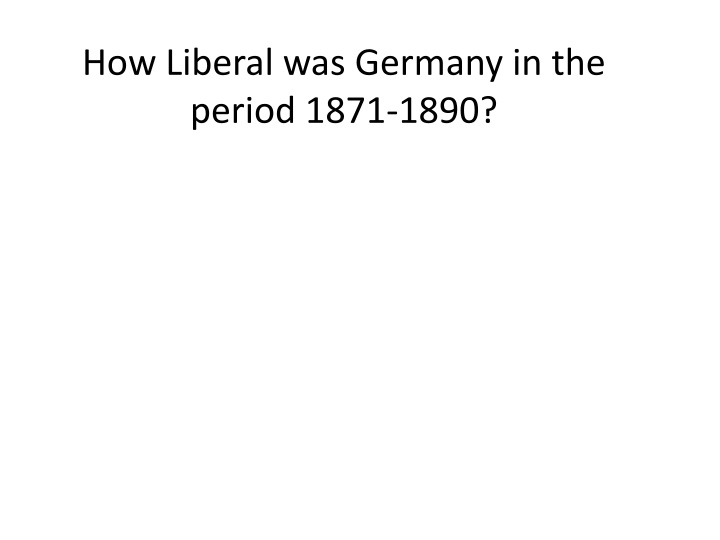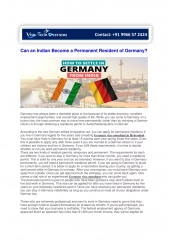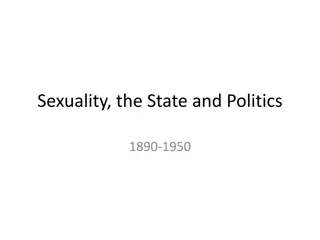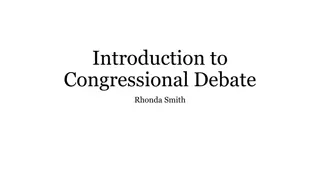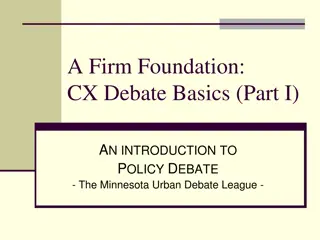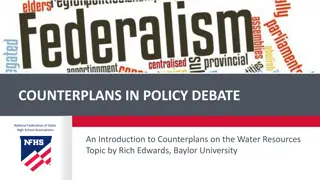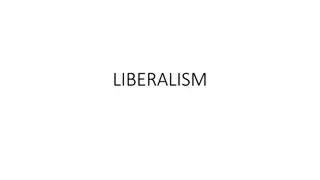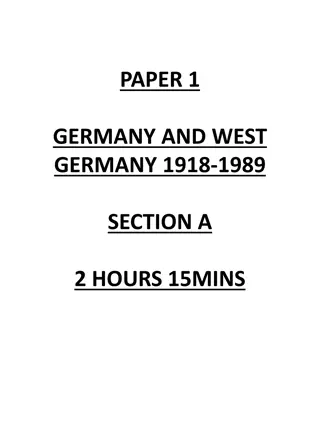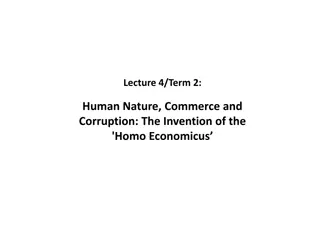Germany's Liberalism Debate 1871-1890
Germany in the period 1871-1890 experienced a blend of liberal and conservative elements, with a prevailing conservatism. The debate centers on whether this period marked a shift from a predominantly liberal to a predominantly conservative state, despite the presence of democratic politicians and observers at key events like the proclamation of the German Reich in 1871. Understanding the key concept of liberalism is crucial, focusing on protecting rights, individual liberties, and placing governance in the hands of those with a stake in society. Liberalism's essence is distinguished from political party labels.
Download Presentation

Please find below an Image/Link to download the presentation.
The content on the website is provided AS IS for your information and personal use only. It may not be sold, licensed, or shared on other websites without obtaining consent from the author.If you encounter any issues during the download, it is possible that the publisher has removed the file from their server.
You are allowed to download the files provided on this website for personal or commercial use, subject to the condition that they are used lawfully. All files are the property of their respective owners.
The content on the website is provided AS IS for your information and personal use only. It may not be sold, licensed, or shared on other websites without obtaining consent from the author.
E N D
Presentation Transcript
How Liberal was Germany in the period 1871-1890?
Die Proklamation des Deutschen Kaiserreiches by Anton von Werner (1877), depicting the proclamation of the foundation of the German Reich (18 January 1871, Palace of Versailles).
Versailles, 1871 The ceremony was attended by democratic politicians but they were there as observers not as participants. The message was clear: the empire was a gift to the people from the princes, not the other way around (as in 1848).
How liberal was Germany 1871-1890? Possible answers: Entirely liberal (no!) Entirely conservatives (no!) Predominantly Liberal (no!) Predominantly Conservative (yes!) So where is the debate? All historians recognise that Bismarck s Germany was a mixture of liberal and conservative elements but that conservatism predominated. The debate is whether it was always thus or whether the year 1879 represented a turning point from a state that is predominantly liberal to one that is predominantly conservative.
Introduction Don t confuse Liberalism with the Liberal parties they are not the same thing. Neither the Progressives nor the National Liberals are a barometer of liberalism, your definition at the outset is your barometer! Sometimes parties that call themselves Liberal can favour conservative policies. What did liberalism entail for constitutions and individual rights, for trade, for trade unions, for welfare, for workers, for middle classes, etc. what was it open to, what was it hostile to?
Understanding the key concept: Liberal/Liberalism Key documents, both from 1776: American Declaration of Independence Adam Smith s Wealth of the Nations Belief in the essential goodness of human beings: a perfect society could therefore be achieved by the establishment of a regime which preserved their liberties and empowered them to choose their rulers. Also born in the French Revolution AND the reaction AGAINST the terror of mob violence that followed when the middle classes lost control of the revolution (helps explain what happened in 1848). Constitutionalism designed to protect rights and liberties and ensure that government was in the hands of those who had material interests to defend; but not in the hands of the mob.
What was liberalism? FOR: Economic and professional freedom; State protection of laws and frontiers; Parliaments elected by a property owning, tax-paying citizens; Parliamentary government. AGAINST: Governments intervention in economic matters; Trade Guilds Trade Unions SUSPICIOUS of state support for the poor (leads to high taxation; creates a dependency culture) Extending the franchise to the working classes. Religion and its interference in the lives of citizens of an established church. KEY WEAKNESS Liberals were economically strong, but not demographically or electorally. (This was a key reason for the failings of the 1848 revolutions AND this is one of the reasons Bismarck supported universal suffrage in the first place he thought the electorate as a whole would act as a check on liberal ambition).
Thematic approach Deal with each of the following (where possible, and without being rigid), on a two-handed basis: i.e on the one hand this was liberal, on the other hand it was conservative. Constitution Kulturkampf Economics pre and post 1878 Social Policy (anti-socialist law and so-called state socialism) Germanisation
Theme 1: constitution The constitution was liberal on the surface, but underneath it was conservative On the one hand Bismarck created one of the most democratic parliaments in the sense that it was elected on universal suffrage; that gave veto powers to the Reichstag, so the government was held in check by the elected Reichstag. The Reichstag had control over the national budget, 80% of which was concerned with the army; this gave the Reichstag a sense that it had control over the army. The federal principle was another potential check on the government; On the other hand . This was NOT a parliamentary government; The government was appointed, not elected; Universal suffrage was not welcomed by the Liberals; Bismarck thought that it would give expression to conservative working class. In practice, the Bundesrat was controlled by Prussia; and at no point checked the policies of the government. In practice, the army was answerable only to the Kaiser; and Bismarck was able to persuade the Reichstag in 1874 to approve the budget only every 7 years (the septennats). The Kaiser had the power to dissolve the Reichstag and call fresh elections Bismarck in effect used this to create a referendum on loadstone policies, particularly in 1878.
Principles or demographics? What were Bismarck s motives in creating this constitution with a mixture of liberal and conservative principles? What interpretation do we put on this? Was Bismarck merely aiming to use liberal principles to preserve the power of the monarchy and ultimately himself? Did he care at all about liberalism/conservatism? If he didn t care about liberalism, why did he build the Reich on some fairly key liberal principles? Did he expect the Reichstag to be more quiescent than it was? Did he create a more liberal state than he intended and in that context produce kulturkampf, the 1878 Anti-socialist law and the Tariff Act of 1879? What mattered to him more was it about principles or demographics?
Theme 2: Kulturkampf In the 19thcentury the Catholic Church promulgated a series of contentious dogmas and encyclicals: In 1832, in the encyclical Mirari vos, Pope Gregory XVI condemned liberalism, free press and Freethought. Under the leadership of his successor, Pope Pius IX, in 1854, the church proclaimed Mary s immaculate conception. In 1864, the Vatican published the encyclical Quanta cura and Syllabus of Errors; The Syllabus of Errors condemned 80 philosophical and political statements including freedom of religion, free thought, separation of church and state, civil marriage, sovereignty of the people, democracy, liberalism, and socialism and reason as the soul basis for human action. The announcements included an index of forbidden books. In 1870, the Vatican Council declared the dogma of Papal infallibility.
Kulturkampf: background The Catholic dogmas and doctrines announced in 1854, 1864 and 1870 were perceived in Germany as direct attacks on the modern nation state. Before 1866 liberal majorities in the Diet of the German Confederation and in the Prussian parliament as well as liberals in general regarded the Church as backward, a hotbed for reactionaries, enemies of progress and cast monastic life as the epitome of a backward Catholic medievalism. Prussia was not alone in its suspicions. As in many European countries, Jesuits were being banned or heavily restricted in many of the German states e. g. in Saxony (1831) and even in Catholic ones such as Bavaria (1851), Baden (1860) or W rttemberg (1862). Prussians were particularly alarmed by the dramatic rise in the numbers of monasteries, convents and clerical religious groups. The Diocese of Cologne, for example, saw a tenfold increase of monks and nuns between 1850 and 1872. After 1871 Prussian authorities were particularly suspicious of the spread of monastic life among the Polish and French minorities.
Kulturkampf: background Not just liberals, but many Catholics themselves in Europe were critical of the moves towards papal centralisation. The pope s handling of dissent e.g. by excommunication of critics or demanding their removal from catholic schools and universities was considered authoritarian. As a result of these measures, in 1870 conservative Austria cancelled the Concordat that it had created with the church in 1855. Saxony and Bavaria withheld approval to publish the papal infallibility; Hesse and Baden even denied any legal validity. According to the Bavarian head of government, Hohenlohe, the dogma of infallibility compromised the Catholic's loyalty to the state In this context, Bismarck s measures appeared less conservative than they do to our eyes and could be seen and certainly this was the way he portrayed them as standing up for religious freedom.
Bismarcks motives Unification had been achieved through many obstacles with strong opponents. These were the European powers of France and Austria, both Catholic nations, and the Catholic Church itself, the three of which Bismarck perceived as a "Coalition of Catholic Revenge". In the Austro-Prussian War of 1866 and Franco-Prussian War of 1870 the Catholic Church sided against Prussia and it was an outspoken opponent of German unification under Prussia (as well as of Italy s unification). 1870 the year of the infallibility decree and the year before Unification, Zentrum was founded specifically to defend catholic interests within the new Protestant Reich. At unification in 1871, the new German Empire included 25.5 million Protestants (62% of the population) and 15 million Catholics (36.5% of the population). Given that protestants were divided among a range of parties, it is no surprise that Zentrum became the second largest party in 1871. Although a minority in the empire, Catholics were the majority in the states of Bavaria, Baden, and Alsace-Lorraine as well as in the four Prussian Provinces of West Prussia, Posen, Rhineland, Westphalia and in the Prussian region of Upper Silesia. During the War-in-sight crisis, Bismarck was worried about French influence amongst Catholics in Germany. Bismarck was highly concerned that many major members and supporters of this new party were not in sympathy with the new empire: the House of Hanover, the ethnic minority of the Poles, the southern German states
Bismarcks motives For Bismarck, the empire was very fragile and its consolidation was an important issue. Biographer Otto Pflanze emphasizes, "Bismarck's belief in the existence of a widespread Catholic conspiracy that posed a threat to both his German and European policies. In August 1871 at Bad Ems, Bismarck revealed his intention to fight against the Centre Party, to separate state and church, to transfer school inspection to laymen, to abolish religious instruction from schools and to transfer religious affairs to the minister of justice
Adalbert Falk On 22 January 1872, liberal Adalbert Falk replaced conservative Heinrich von M hler as Prussian minister for religion, education and health. In Bismarck's mind, Falk was "to re-establish the rights of the state in relation to the church". Yet, unlike Bismarck, whose main motivation for the Kulturkampf was the political power struggle with the Centre Party, Falk, a lawyer, was a strong proponent of state authority having in mind the legal aspects of state-church relationships. Falk became the driving force behind the Kulturkampf laws. Although Bismarck publicly supported Falk, he doubted the success of his laws and was unhappy with his lack of political tact and sensitivity. The differences in their attitudes concerning the Kulturkampf eventually put the two politicians at odds with each other.
Legal Aspects From 1871 to 1876, the Prussian state parliament and the federal legislature (Reichstag), both with liberal majorities, enacted 22 laws in the context of the Kulturkampf. They were mainly directed against clerics: bishops, priests and religious orders (anti-clerical) and enforced the supremacy of the state over the church. Constitutionally, education and regulation of religious affairs were vested in the federal states and the leading actor of the Kulturkampf was Prussia, Germany s largest state. But some of the laws were also passed by the Reichstag and applied to all of Germany. In general, the laws did not affect the press and associations including Catholic ones
Legal measures Imperial Laws: 1871 Pulpit law prevented sermons being used for political agitation (Bavarian initiative) 1872 School supervision Act abolished church oversight of the Prussian primary school system. From the liberal perspective, a neutral education system was a basis for a progressive state; for Bismarck, it was about ensuring that the church would not use education as a vehicle for turning the young against the government. Law prevents Jesuits from setting up establishments in Germany. Prussian Laws or May Laws 1873 measures included stipulation that all candidates for priesthood to attend university for 3 years before training as priests and all church appointments subject to a veto by the state 1874 births deaths and marriages in Prussia now responsibility of state not church Zentrum s leader, Ludwig Windthorst, called upon Catholics to make the 1874 elections a great plebiscite against Bismarck s policies in the elections of 1874. In alliance with the Danes, Poles, and Alsatians, Zentrum won 91 seats in the Reichstag. 1875 All religious orders (except nursing ones) were dissolved. Prussian government given power to suspend state subsidies to all dioceses where clergy resisted news laws. Resistance the church declared the laws illegal, and as a result: 241 clergy and 136 editors were fined or imprisoned and over a thousand parishes were left without incumbents. By 1876, all but 2 of the 12 Prussian Catholic bishops were in exile or under house arrest; and more than 1000 priests had been suspended.
How Liberal was Kulturkampf? Was it a means to win Liberal support without really tackling important, constitutional issues? During this period he was able to persuade the Reichstag to pass un-liberal laws the May Laws against Catholicism coincided with an agreement that the army budget would be set every 7 years (Septennats) rather than every year; and secondly a law that would reduce the freedom of the press.
How Liberal was Kulturkampf? Hajo Holborn examines the contradictions between the Kulturkampf and liberal values: only those laws that separated state and church could be defended from a liberal point of view. Full state control over schools was a liberal ideal. It was also logical to introduce the obligatory civil marriage law and entrust civil agencies with the keeping of vital statistics.... But all the other measures constituted shocking violations of liberal principles. German liberalism showed no loyalty to the ideas of lawful procedure or of political and cultural freedom which had formerly been its lifeblood. With few exceptions the German liberals were hypnotized by the national state, which they wished to imbue with a uniform pattern of culture. They were unable to recognize that the Kulturkampf was bound to undermine the belief in the Rechtsstaat (government by law) and to divide the German people profoundly.
How Liberal was Kulturkampf? Anthony J. Steinhoff argues that "Bismarck s plan to disarm political Catholicism delighted liberal politicians, who provided the parliamentary backing for the crusade. Yet, the phrase the left-liberal Rudolf Virchow coined for this struggle, the Kulturkampf, suggests that the liberals wanted to do more than prevent Catholicism from becoming a political force. They wanted victory over Catholicism itself, the long-delayed conclusion of the Reformation". Gordon A. Craig argues that: In the name of freedom they [the liberals] underwrote laws that denied it, and placed their party, which pretended to maintain the cause of the individual against arbitrary authority, squarely behind a state that recognised no limits to its power. Even if Bismarck had not abandoned and broken them in 1879, it is doubtful whether they could have survived this betrayal of their own philosophy
Kulturkampf dropped In 1878 Death of Pope Pius IX gave Bismarck opportunity to step back from this policy; he entered negotiations with his successor Pope Leo XIII in February 1878; an indication that Bismarck accepted that Kulturkampf had failed, having increased rather than removed disunity. In July 1879, Adalbert Falk a hero for the liberals because of his prominent role in the attack on Catholicism was replaced by the conservative Robert von Puttkamer. It has been alleged that the latter, from 1881 oversaw a purge of liberal sympathisers in the higher civil service, which henceforth became an even greater bastion of aristocratic privilege. It would nonetheless be the mid-1880s before any anti-Catholic legislation was finally removed from the statue books. When calls for protectionism emerged from the industrial and the agricultural community after 1873, Bismarck began to loosen the emphasis upon Kulturkampf from 1878 and in 1880 the church declared that it was over. His motives for dropping the policy were ultimately a) because it didn t work; b) Bismarck was probably not as in favour of the harsh treatment of Catholic office bearers as Falk had been and recognised the dangers of this path; and c) because he needed a broader base of support in the Reichstag if he was to push through the reforms on Tariffs. There is an argument, therefore for saying that both Bismarck s support and his ending of Kulturkampf were done for liberal reasons, but it seems far more likely that he was simply being pragmatic (realpolitik).
Theme 3: the Economics of the Reich At first, the Reich represented the political expression of the Zollverein and championed free market ideas. The economic situation before 1878 favoured free trade; the Reich initially represented the political stance of the Zollverein and encouraged free market ideas. The currency legislation of 1871 fixed an exchange rate between other currencies in the federal state and the mark until the Goldmark was introduced in 1873. The establishment of a single currency, the Reichsmark, which added some 762,000,000 marks to the amount of free capital in the economy. The establishment of the Reichsbank, set up as Germany s Central Bank in 1875. Law was passed in 1870 was passed that forbade the formation of further central banks and the Draft Banking law of 1874 created the Reichsbank and closed all but four of the Notenbanken in other federal states. The currency legislation and the Reichsbank both further economically united Germany and made internal trade within the Zollverein much simpler and hence desirable
The Grundzeit The period between 1871 and 73, sometimes called the Grunderjahre (foundation years) or Grundzeit witnessed: The railway network grow by nearly 27% The amount of goods trafficked grow by over 70% Coal production rise by 38% Iron production grow by 61% Steel production grow by over 50%. Iron and steel works grow (as many were built between 1870 and 1875 as had been over the preceding 70 years) as a result of growth in the railway network; An Annual productivity increase of nearly 5%.
The Great Depression However, Germany s early success wasn t only about free-market: The acquisition of Alsace-Lorraine and the French indemnity which added 5 million francs to the German economy were hardly about free trade . The stock market grew rapidly during the grundjahre from 96.4 in 1870 to 193.1 in 1872. But Germany was not alone in its over-confidence. The collapse came first in Austria, in May 1873, and then spread to all major industrial economies and financial centres, including London and New York. The collapse in Berlin began in October 1873: The shares of nearly 540 public companies almost halved (from 450 billion marks to 2.5 billion). The shares of three major Berlin banks were also (roughly) halved. The prices of industrial goods e.g. iron, coal, and steel collapsed (index prices 181 to 76 and from 116 to 49 of iron and coal respectively) The loss of jobs and the effect on wages was severe. For example, the income of Krupp workers was halved between 1873 and 1878. (Feuchtwanger, pp. 67- 68)
Calls for protectionism The immediate outcome of the depression was calls for the abandonment of the liberal economics of free trade and the adoption of more protectionist ones. Pressure came from East Elbian Junkers first. In particular the League for the Protection of the Economic Interests of Rhineland and Westphalia (the Long Name Society), established in 1871, and the League for Economic and Tax Reform. They experienced competition from imported American and Russian grain and wool from Australia, made possible by railways and refrigerated shipping. In 1876, Germany became a net importer of grain, threatening the traditional Prussian ruling elite with bankruptcy. But by 1875 they had begun to win support from the local chambers of commerce by appealing to both commercial and nationalist sentiments arguing that Germany should be as self-sufficient as possible as dependency upon other countries could prove fatal at a time of war. In 1875, they even convinced the Congress of German Economists, which had hitherto been a citadel of free traders as well as the League of German Iron and Steel Industrialists (representing 214 firms), established in 1873. In February 1877, industrialists and farmers in Westphalia drew up a general declaration in favour of protective tariffs. In October of the same the year the Central Association of German Industrialists and the Long Name Society agreed a detailed tariff scale on imports which laid the foundations of the alliance between Junkers and heavy industrialists that would come to dominate later Wilhelmine politics. In 1878 the failure of Bismarck s initial attempt to pass a Tariff Bill led to a dissolution of the Reichstag and fresh elections. The bill was eventually passed in 1879, with the support of Conservatives, Catholic Centre Party and 15 National Liberals. This marked a significant change in Bismarck s Reichstag coalition; in particular, it marked a decisive break with the Liberals, but it did not give Bismarck greater control over the Reichstag.
Was 1878-9 really a turning point? Tariffs were a loadstone issue The 1873 crash provided a golden-opportunity for critics of liberalism, conservatives and survivors of pre-industrial economics, to attack the new industrialism and to discredit both political and economic liberalism. Bismarck s motives were multiple: Pressure groups In particular from the Central Association of German Industrialists and the League for Tax and Economic Reform (Junker Farming interests) Reich finances Rise of Zentrum and need to shift alliances? Bismarck s paranoia about change under Frederick and Vicky both in constitution and in personnel? But wasn t he always concerned to protect the interests of Junkers first and industrialists second? Wasn t it always about rye and iron (rather than blood and iron)? Was it about the rejection of liberalism or just pragmatism in the face of the prevailing economic conditions? Anti-socialist law divided the liberals, but was it really so anti-Liberal? Why would industrialists approve? Was it merely a coincidence that Tariff Laws coincided with the establishment of the Dual alliance?
Getting the Tariff law through the Reichstag To get the protectionist measures through the Reichstag he had to break the alliance of Progressives and National Liberals. He put forward anti-socialist law and when this was rejected, he used the double attempt on Wilhelm I s life in 1878 to call fresh elections (the previous election was 1877).
Political outcomes Bismarck now committed himself to a Conservative coalition an alignment consisting of the Conservatives, Free Conservatives and a much weakened National Liberal Party. The National Liberals were barely able to fight the Prussian elections in 1879 as a united party and Lasker s resignation in 1880 precipitated a further 27 desertions from the party who went on to win almost as many seats as the National Liberals in the 1881 Reichstag elections. The National Liberals split in two. Those who still believed in free trade and parliamentary government broke away, uniting with the Progressives to form a new radical party in 1884 called the Free Thought Party. However, it is important to note that the rump National Liberal party remained loyal to Bismarck, and endorsed the Heidelberg Declaration of 1884, which approved of protection and Bismarck s social insurance scheme and the importance of agriculture in Germany s economic life.
Political outcomes Thanks to the Frankenstein clause, the Reich government was unable to turn the Tariff law into a money generator for the state. Zentrum did not commit itself to support for Bismarck Kulturkampf was not completely resolved and Catholics remained suspicious of protestant Prussia. Workers remained suspicious of the state and the SPD (like Zentrum before it) went from strength to strength. Bismarck did not control the Reichstag for most of the 1880s a mark of the liberal checks and balances on the government. To defend the fragile structure of the Empire from revolutionary change became a labour of Sisyphus (Wehler), increasingly dependent upon one expedient after another, including plebiscitary elections over foreign policy issues and imperialist diversions in Africa.
Economic Outcomes Politically, the outcomes of the policy shift of 1878-9 were to cost Bismarck control of the Reichstag the National Liberals emerged from the crisis too weak to continue to support Bismarck s policies by themselves However, the policy shift did help maintain German economic growth Germany invested in pioneering technology e.g. the Gilchrist-Thomas steelmaking process which enabled German industrialists to exploit local low-grade iron-ore to undercut foreign competition. Increased mechanisation and rationalisation meant that there were large increases in productivity in textiles, coal, iron and steel; The population continued to migrate from the east Elbian provinces to Berlin and the industrial Ruhr. This was accelerated by the introduction of machinery into the Junker estates and the planting of potato and sugar beet, which were more effectively harvested by cheap Polish labour employed on a seasonal basis.
Indicators of growth Coal production increased from 37.9 milllion to 89.1 million by 1890; Steel production increased from 169 thousand metric tons in 1871 to 660 by 1880 and 2161 in 1890. Pig-iron production grew from 1.4m tons in 1870 to 4.0m tons in 1890.
Was 1878-9 really a turning point? Tariff Law was a loadstone issue The 1873 crash provided a golden-opportunity for critics of liberalism, conservatives and survivors of pre-industrial economics, to attack the new industrialism and to discredit both political and economic liberalism. Bismarck s motives were multiple: Pressure groups Reich finances Controlling the Reichstag - did the rise of Zentrum mean that Bismarck needed to shift alliances? Did the need for Tariffs necessitate a shift in alliances? Bismarck s paranoia about change under Crown Prince Frederick William and Princess Victoria both in constitution and in personnel? But wasn t he always concerned to protect the interests of Junkers and industrialists? Had this project been abandondoned? Wasn t it always about rye and iron (rather than blood and iron)?
What had really changed? Reich economics had never been truly about free trade the indemnity and the acquisition of iron ore mines from Alsace Lorraine helps explain the early boom of the grundjahre; Pure liberalism may have been abandoned but not the industrial bourgeoisie themselves; Bismarck s powerbase remained a union of rye and steel in that sense, nothing had changed. The 1879 Tariff Act did not set the clock back so that industrial progress was reversed quite the opposite! There was no abandonment of economic growth even if there was some abandonment of social mobility.
Social outcomes Industry and agriculture after 1879: alliance of rye and steel protected by the state? Monopolies/Cartels a form of authoritarianism? Between 1875 and 1890 over 200 cartels were set up (Williamson, p. 49), increasing the concentration of German industry into large units, and into an elite of powerful industrialists and bankers who would form a close alliance with the aristocratic Prussian ruling class. In this context the workers might have proved to be undoing of these ideas: Between 1880 and 1890 the number of cities with a population of over 100,000 increased from 15 to 26% and during that decade industry began to employ more people than agriculture. German population who lived in cities grew from 36 to 42% by 1890. The changing demographics had to be accommodated within the Bismarckian system if the interests of Junkers and of industrialists were to be preserved, and it is this which partly explains his social policies in the 1880s.
Theme 3: Social Policies At the 1877 elections, the SPD gained 500,000 votes, giving them 12 Reichstag seats. In 1878 an anarchist (i.e. not a socialist!) tried to assassinate Emperor Wilhelm I, Bismarck tried to use this as a pretext on which to pass through an anti-socialism bill but was defeated by National Liberals concerned about civil liberties. A 2ndattempt on Wilhelm s life a week later led Bismarck to criticism the National Liberals and dissolve the Reichstag. The SPD and National Liberal vote suffered to the Conservative coalition s advantage. The Anti-Socialist Law of October 1878 banned all social democratic, socialist or communist activity short of standing for election. Socialist organisations, including trade unions and working-class clubs were dissolved and banned; Constituency organisation was broken up; Socialist publications were outlawed;
Motives behind the Anti-Socialist Law To use the 1878 election as a referendum on liberalism and to split the progressives and National Liberals and to build a new coalition of interests that would support protectionism. Progressives were outraged by the clamp down on political freedoms. The Anti-Socialist law was passed in October 1878 and the Tariff Act was passed with Zentrum, conservative and the rump of the National Liberals in 1879. To protect industry from below (i.e. trade unions were the real target) at a time when industry was seeking protection from abroad too.
Effects of the Anti-Socialist law Trade Unions virtually crushed (except for the Hirsch-Dunker unions which were associated with the Liberal parties and operated more as welfare organisations than as genuine trade unions committed to wage bargaining.) 45 out of 47 party newspapers suppressed. Prussian government imposed a minor state of siege in Berlin in 1879 with 67 leading socialists arrested and expelled from the city. This was repeated in the Silesian city of Bresual. Similar measures in Hamburg in 1880 and Leipzig in 1881; Before the election of 1881 police stepped up their activities and 600 were arrested; Because of sheer shortage of candidates, Bebel had to stand in 35 constituencies and Liebknetcht in 16! 1881 elections saw SPD vote cut by one-third.
Social Insurance (N.b. this is a label historians use, Bismarck wouldn t have called it this.) Pflanze calls it an attempt to integrate the workers into a German national consensus based on the Prussian-German establishment. Liberals were suspicious of this policy because it represented another form of protectionism. Working classes did not stop supporting the SPD in the long run. 1883 Sickness Insurance Act provided medical treatment and up to 13 weeks sick pay to 3 million low-paid workers; workers paid 1/3rdcontribution and employers 2/3rd. Bismarck proposed that the state supplemented the workers contribution, only for this to be defeated by the National Liberals and Zentrum, as the former suspected state socialism, and the latter feared any strengthening of central government. 1884 Accident Insurance Act gave a worker permanently disabled or sick for more than 13 weeks a living allowance financed wholly by employers. 1886 Accident insurance scheme was extended to cover 7 million agricultural workers. 1889 Old Age and Disability Act which gave pensions to those over 70, and disablement pensions for those who were younger. Workers, employers and the state paid for this.
Bismarcks state socialism failed to integrate the workers into the consensus as periodic labour unrest and increasing votes for SPD showed. Workers remained cynical in the face of a ban on Trade Unions. New electoral organisations, masquerading under the bland but legal name of societies for municipal elections were created in the large cities, which enabled the SPD to rebuild its grass-roots organisation. In 1884 The SPD doubled its seats from 12 to 24 despite the ban. Between 1878 and 1890 1500 socialists were imprisoned and a great many emigrated; but the anti-Socialist Law did not eliminate socialism and did not prevent SPD members from standing for election and speaking freely; after 1878 the SPD won increasing support. So long as working conditions remained harsh, the SPD was assured of a future.
Theme 4: Germanisation policies Bismarck regarded national minorities as potential enemies of the state : Alsace-Lorraine was not granted full autonomy; but became a special region under direct imperial rule with governor and Prussian civil servants; German language was imposed on schools and local administration; French people who disliked German rule were allowed to leave; 2,300,000 Poles lived in Prussia s eastern provinces but Bismarck outlawed use of Polish in education and law courts; Bismarck was not anti-Semitic but he responded positively to demands from Conservatives to control illegal Polish and Jewish immigration, which increased in 1881 after the pogroms in Russia, by strengthening border controls on the eastern frontiers of the Reich. Four years later local authorities were suddenly ordered to expel within 2 weeks all illegal aliens: 1885-6 some 16,000 Poles and Jews with Russian citizenship were herded across the frontier; by January 1888 32,000 aliens, of whom 10,000 were Jews, had been expelled. In 1885 Polish deputies were backed by Zentrum and the Liberals to question the government about it;
Germanisation policies January 1886 the Reichstag insisted on debating the issue and a majority censured the Imperial government. Adolph Stoecker (Chaplain to Wilhelm I) founded a party known as the Christian Social Party, which exploited anti-Semitism and promised a state welfare system but this achieved little or no success at the expense of the SPD.
Germanisation certainly looks authoritarian and illiberal, but by the standards of the time, it was perhaps less so Russia had Russification policies during the same period The Hungarian side of the Austro-Hungarian empire (an empire whose dual German- Hungarian populations were less than 50% of the total, and whose size was second only to Russia) carried out Magyarisation policies
Continuity? Bismarck built the new Germany with the help of the National Liberals, although he lost the support of the secessionists (Liberal Union), he retained the support of the National Liberals who made the 1884 Heidelberg Declaration in favour of his social policies. Was Kulturkampf so different from Germanisation? Was Bismarck ever really a Liberal? Was he ever really a conservative? Did Bismarck care any more about Junker and industrialist interests after 1878 than he did before? Was it Bismarck that changed or was it the political perspective of the interests he was trying to protect (i.e. business and farming) that changed in response to the depression?
Change or continuity? The issue of Liberalism is important because it has been argued that the weakness of Liberalism in Germany explains the rise of authoritarian right-wing politics later on. But if we focus only on the Bismarckian period (which is what this question is really about), the real question is whether Bismarck founded a Liberal Germany in 1871 only to replace it with a more conservative/authoritarian Germany in 1879. So a big part of the issue is whether Germany was Liberal or Authoritarian or whether it changed from being one to the other. It is important that you understand why historians would argue that it did and why others argue that it didn t. In a nutshell, the view I would take on Germany is that it was semi-authoritarian. It was neither completely one thing nor the other but there was a careful balance between Liberal and Conservative interests. Bismarck created a constitution in which his own personal position was pivotal. The balance maximised his own personal influence so long as he had the support of the Kaiser. The changes of 1879 are outweighed by the continuities. The German state was a mixture of both liberal and conservative principles from the beginning. It s important not to exaggerate the liberalism of the pre-1879 years or underestimate its continued importance after 1879.
Writing the essay: Introduction Introduction Keep it brief; What is the question about? What is the meaning of Liberal in this period? Bismarck is the architect of the new Germany what were his goals? Did he fulfill those goals? What is your line of argument? Above all what is your answer to the question? Historians are agreed that Bismarck s Germany was a mixture of liberal and conservative elements but that conservative elements predominated. The DEBATE is whether the conservative Germany was created in 1879 or whether it had always been there. What was Bismarck s policy for German?. What did he want to do? How far did he achieve it? Did he begin with liberalism and then shift to conservativism in 1879 or was there more continuity than that?
How Liberal was Germany in the period 1871-1890? Main body of essay should deal with these themes. 5-6 Paragraphs these break down the answer to the question into 5-6 key arguments. Essays that do this are becoming analytical. First lines must be directed at the question, brief and to the point. It represents one part of your overall argument. Paragraphs that do this offer not merely a signpost to the reader, but one installment of the overall argument (again, essays that do this are becoming analytical). Explain the point made or 1st part of it (hence, analysis breaking down) Evidence offer examples/evidence to support the argument. Explain second part of it (if required) Evidence - offer examples/evidence to suport the argument Last lines judgment sentence (should tie in with the overall line of argument that you took in your introduction). In this case: is the issue predominantly liberal or conservative?
How Liberal was Germany in the period 1871-1890? Conclusion Final judgement should be 100% predictable. It should be consistent with everything that you have argued until this point. The only things not predictable is any final, decisive connections. The question is about Germany rather than Bismarck personally, nonetheless, Germany in this period was very much the product of his constitution and his policies. He had built an alliance with the National Liberals by 1866; how far did he want to take that? Was he looking to ditch that at the first opportunity?
